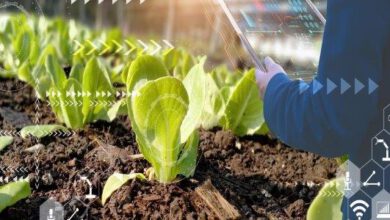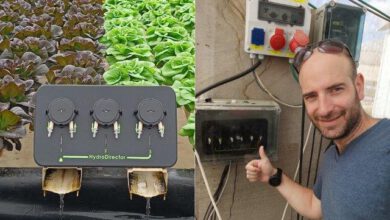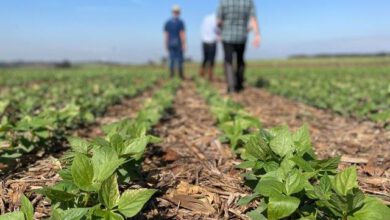Revolutionary platform for an efficient data driven smart farm
A Smart Farming Platform that sheds light on otherwise unmeasurable field operations
Alma Karni, info@fieldintech.com


The best scientists are working to sustain and streamline the agriculture industry, so that thousands of years of agriculture will meet the demands of the modern world. Agricultural work methods have been preserved for thousands of years while technology has made them more efficient and effective over time. Utilizing the right technology can cause positive changes to a variety of aspects regarding agricultural produce and humanity as a whole.
Fieldin was founded in 2013 by Boaz Bachar and Iftach Birger, who were focused on developing a Smart Farming Platform that sheds light on otherwise unmeasurable field operations.
“Our Mission is to develop a practical platform that harnesses data to create effective and smart farms. Fieldin provides actionable, easy-to-use data at every stage of the growing cycle. From field scouting and spray planning, to the execution of harvesting and other cultural practices, our analytics and insights provide transparency and efficiencies for the entire operation. We’re fortunate to be working with some of the largest, most efficient growers in the world. We’re using that understanding and knowledge to build a solution for everyone and provide powerful benchmarks for the industry”, Said Bachar.
Fieldin enables growers around the world to manage their farm like a modern factory, by creating a digitized and connected farming operation. Fieldin’s sensors transform any farm machinery into “smart machinery” which sends relevant data to a cloud platform including web and mobile apps.
Fieldin’s platform seamlessly connects all machinery, implements and operators to help growers and provide farm managers with remote visibility into field operations, improving operational efficiencies and agronomic issues across all locations. Fieldin’s Control Center equips managers with real-time alerts to catch critical issues early on, along with ongoing reports that analyze and compare different machines, operators and patterns across multiple varieties or blocks.
Our work in California
Fieldin helps growers reduce ever rising operational costs. Since operational costs keep rising, the only way to maintain profitability is to become more efficient. One example of increasing costs is California minimum wage, that from 2016-2022 will have increased by 50%.
Overtime regulations have posed additional challenges for ag operations, which typically work longer days during the season with 9 to 10 hour shifts. In 2020, overtime kicked in at over 9 hours per day or more than 50 hours per week. Beginning of 2021, overtime pay kicks in at 8.5 hours per and in 2022 it will kick in at 8 hours per day and 40 hours per week.

Along with increasing labor costs, California almond growers have seen spraying and other cultural costs increase by 184% since 1999. according to UC Davis Agriculture & Resource Economics. Harvesting costs have increased by another 56%, further diminishing profit margins.
‘With unstable prices and increasing costs of production, growers need to find ways to be more efficient with their operations to maintain their profitability. The only way to be highly profitable is to become more efficient. Last season, one of our largest customers in California, was able to leverage Fieldin’s platform to improve coverage by 25% more acres per shift during spray applications”, said Iftach Birger, COO and Co-Founder.
Fieldin’s gold standard benchmarks. One of Fieldin’s most significant ways to create value for its customers and for the ag industry as a whole is by producing benchmark reports for the most critical operational tasks on the farm.
Last year, Fieldin published its first Almond data benchmark report which covered the almond industry from 2018-2020. Fieldin aggregated harvesting activities such as mechanical shaking across more than 176K acres of almond orchards in the U.S. and Australia. That data amounts to some 19.8 million trees and 13K operator shifts.
Fieldin’s report helps growers improve efficiencies across harvest operations and provides the ability to act on how they can leverage actionable, real-time data to improve operational efficiencies during the busiest and most important time of the year. Fieldin’s report revealed that the industry standard for mechanized almond tree shaking was thought to be about 50 to 60 trees per hour (Almonds: Botany, Production and Uses, 2017), which would top out at 486 trees per shift.
By monitoring shake/drive/tree times and overall shaking efficiency, growers managing harvesting operations with Fieldin have been able to more than triple those historic shaking numbers and, on average, shake more than 1,500 trees per shift. By comparison, operations using Fieldin to monitor real-time data for shaking activities from 2018-2020 were able to shake on average 12.7 acres per shift, an improvement of 84.1% over the UCCE’s 2019 report. That amounts to an operational cost difference of $80.77 per acre.
“I’m always amazed to see how innovative and adaptive our growers are to the different situations they face. Being able to empower growers during this time is something we at Fieldin are extremely proud of”, Said Birger.
For more info contact us: www.fieldin.com
This article was published originally in ‘Precision Agriculture 2021’




